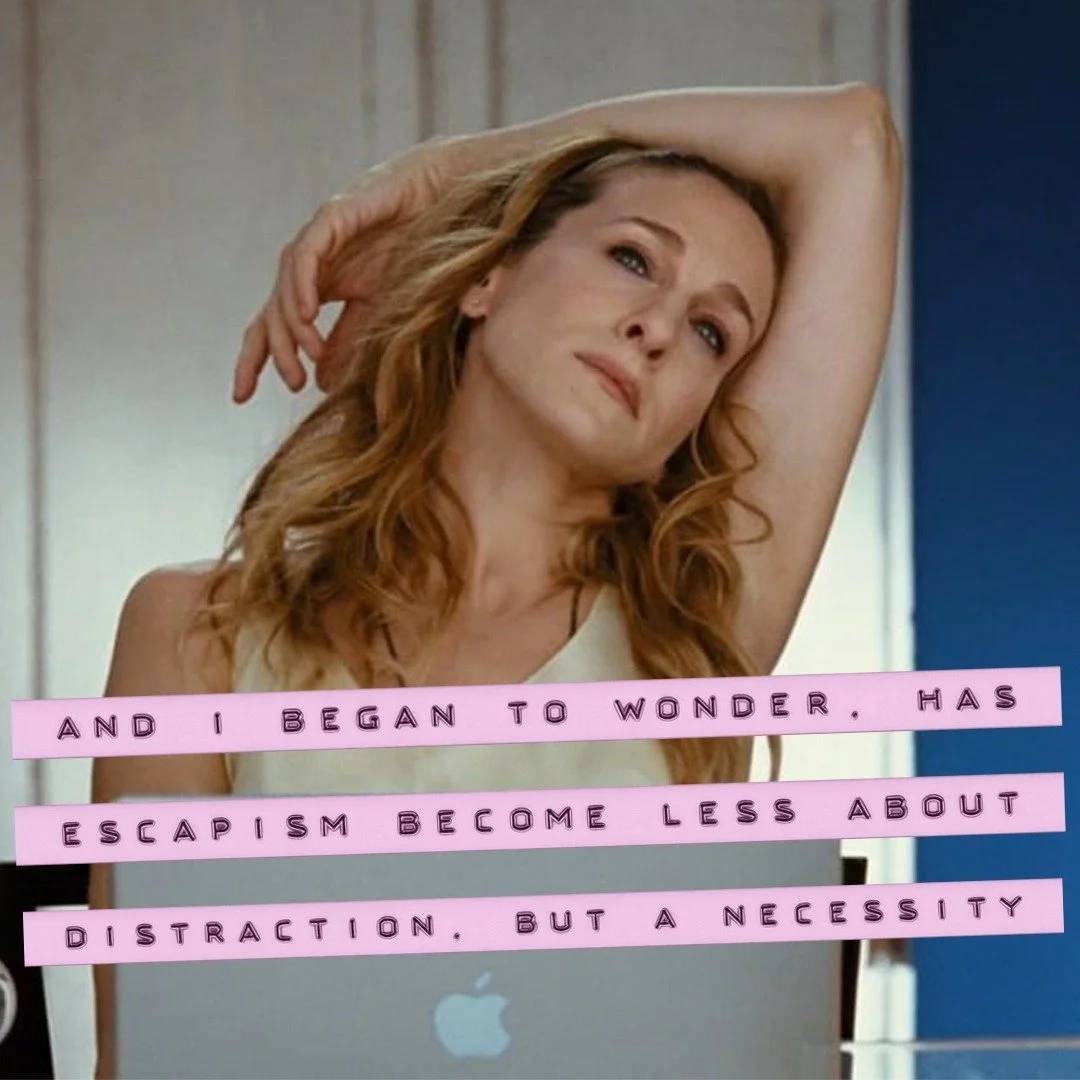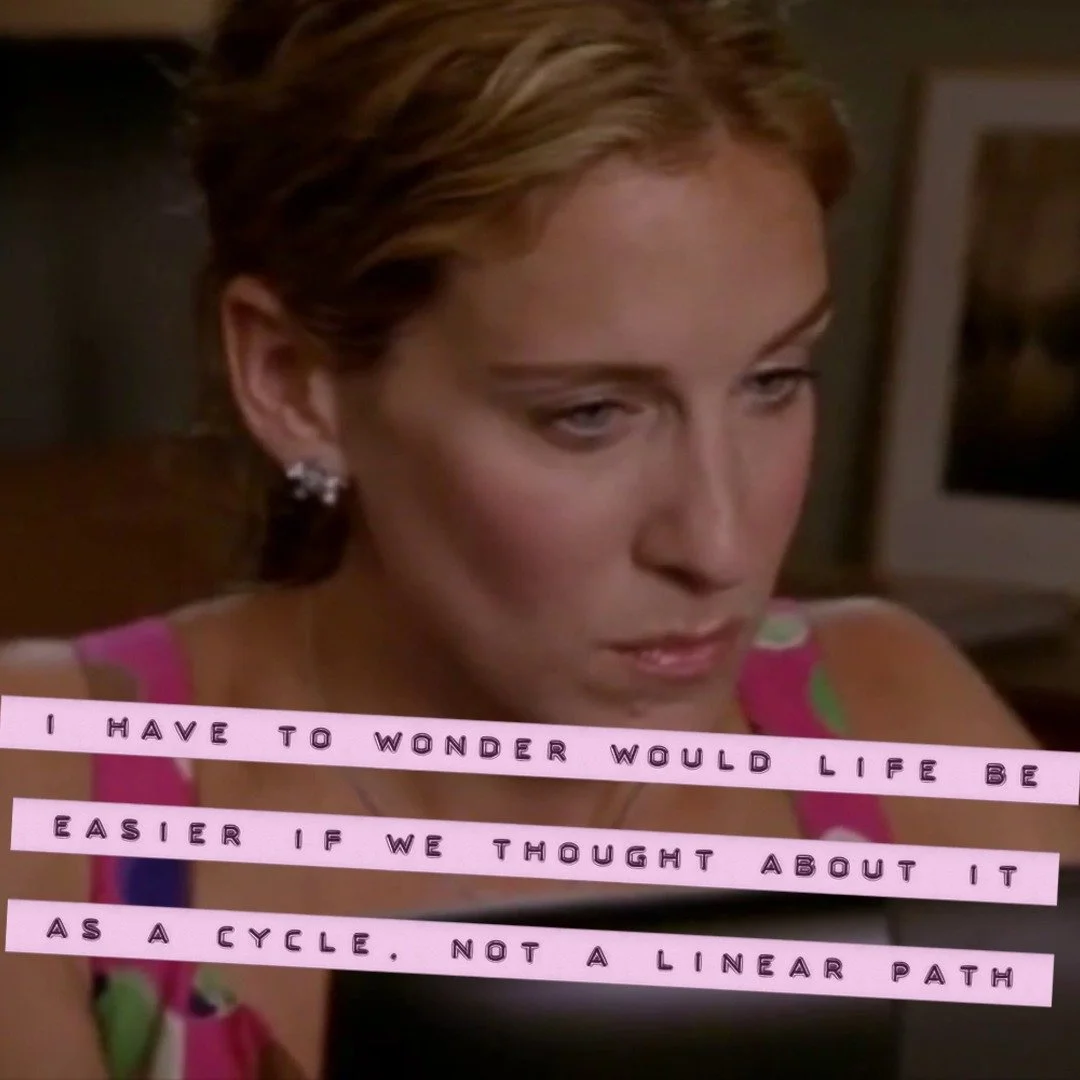And I Began to Wonder… If I Can’t Be Everything Everywhere All At Once, Can I Still Be Anything At All?
‘And I Began to Wonder’ is a series of essays written by Makella Ama, who was inspired to pen down their thoughts in the same style as the lengendaric Carrie Bradshaw in Sex and The City. As a 20-something, Black, first gen immigrant watching the show, Mak couldn’t help but wonder just how far removed some of Carrie’s experiences were, so this is their own exploration of life but like… more Mak, less Carrie.
Every so often I watch a film and as the closing credits roll down the screen, I realise I have entered an additional season of my life (not dramatic at all, I know). It is never timely. I am almost always in tears. I am almost always the last person in the cinema when this happens.
I have made peace with this.
Everything!!!
Recently, I’ve been thinking about … everything… (at least, more so than usual). There’s something about being evicted from your house that will do that to you. I guess there’s also something about sledging through an (ongoing) pandemic that will also encourage you to think about ‘everything’ constantly as well, but anyway, I digress-
Earlier last month my landlord informed me of the news that he was selling the house I’m living in, and for a few weeks after I decided to metaphorically stick my head in the sand and pretend my reality wasn’t my reality. I then decided to hyper-fixate on the idiom ‘sticking/burying your head in the sand’, and in efforts to discover its origin, I learnt that it all went back to a Roman writer named ‘Pliny the Elder’, who’d suggested that when facing predators, ostriches’ tend to bury their heads in sand or bushes in order to make themselves less inconspicuous. This is a lie. Ostriches do not do this. They simply (physically) lay their heads low when they are in states of fear. On this particular day, instead of beginning my search for a new place to live, I reconsolidated a few facts. 1- Men lie a lot. 2- When everything simply feels like too much, I like to accumulate random bits of knowledge that will probably never come into use unless I randomly decided to go on a show like ‘The Chaser’. 3- I really need to find a new place to live.
Everywhere!!!
I recently came across Ernest Agyemang Yeboah’s words
“why talk and say the unsaid words in haste when silence can speak the unspoken words?” and it made me think of a conversation I’d had with a friend after watching ‘Everything, Everywhere All at Once’. Sometimes my brain does this thing when I watch a film whereby I feel so overwhelmed, that when I’m asked “so, what did you think?” the only response I can verbalise is “well…wow…many thoughts! many thoughts!”
I then almost always proceed to explain … none of them, because in that moment of time, I simply cannot. On a good day I will complete my processing and spam my thoughts through text message at a later time, for example: (see image – A, a screenshot of me messaging a friend after realising I had thoughts about the film we’d watched, 24 hours later). My thoughts were largely around media’s newest ‘cool thing’ the use of mULtiVerseSe!!! And how watching Everything Everywhere was the first time I realised how multiverses could actually be a lot more nuanced and liberating outside the typical ‘good vs evil’ // ‘anarchy vs normality’ tropes.
“What is left of love for self and love for others? What is left of you? And of me? Often, nothing. There’s only so much one can carry at one time.”
There’s something to be said about being in this post lockdown aftermath era, where people have begun to dream more about life outside what we know of it and now, we’ve been left with this zeitgeist of people/brands/media hyper-focusing on alternative realities because ours is... well... essentially not that great. Escapism has become less a medium of distraction, and more a medium of necessity. In the last year alone we’ve seen the releases of films like Spiderman: No Way Home (2021), Shang Chi, (2021), Morbius (2022) and most recently Doctor Strange in the Multiverse of Madness (2022). (There’s a trend here: do you see how all these films seem to be produced by a certain company whose name rhymes with Marble? They really need to come up with new ideas, but let’s not get into it).
Everything Everywhere All at Once is the first time I fully realised how the use of multiverses in film has become a tool which taps into collective grief that in many ways, we are all trying to escape from. The aforementioned films explore this in a way which features a trope cast superhero saving the day. Everything Everywhere, however, explores this in a much more poignant way through employing a mother who encourages her daughter to save herself, whilst reflecting on her own flaws that has led to their estranged relationship with each other. This process is not straightforward. It is messy, it is heavy, and it is painstakingly beautiful.
I think about being evicted (a phenomenon that is becoming all too common amongst my peers recently, but I’ll save the landlord rhetoric for another day). I think about the loss I have experienced over the past few years. I think about what life may look like for me during the next 5 years. I wonder whether there’s any point in even thinking that far ahead, after realising that no-one really knows what’s going to happen. I think about the pressures tied into some of my own multitudes; as a woman, as an eldest child from an immigrant family. And then I think about ‘paths’ in general, and how they’re usually presented as this linear, straightforward process in which we move from one thing, to the next and so on and so forth. In this structural dynamic, there is no space to stay still, to go backwards (this is not always a bad thing), or just generally to move in any direction that isn’t simply forwards. In Everything Everywhere, we see Evelyn (the incredible Michelle Yeoh), borrow abilities from other versions of herself in different universes; all these versions living different lives that she could have had if she made different choices “every rejection, every disappointment, has led you here- to this moment.” I think about how, maybe this whole life thing could be slightly easier if we thought about it as a cycle, as opposed to a linear path (see Image B). The choice to go back to/ consult with/ even remember previous, less traumatised versions of ourselves is something we shouldn’t feel ashamed to do. Also, sometimes, people get worse with age; taking a ‘2-step’ backwards is not always a bad idea.
All at once!!!
Sometimes, I like to sit in my room on my bed and I scrunch my eyes shut so hard that I begin to see hazed multicoloured stars. During these moments, my mind often takes me to a place where I’d imagine myself getting smaller and smaller until I am nought but a speck of dust in this universe. (This is not entirely false). In Everything Everywhere, a similar-ish process is paralleled by Evelyn’s daughter, ironically named Joy, who plans her own form of escape through a
euphemised massive, dark, donut shaped hole (I sadly do not have the budget for this, so simply closing my eyes will suffice).
There’s something to be said about feeling consumed by worry, anxiety and pressure and the by-product of overwhelming solitude it leaves behind. In this state, what is left of dreams harboured? What is left of love for self and love for others? What is left of you? And of me? Often, nothing. There’s only so much one can carry at one time.
24 hours after watching the film, I am sitting by myself, in a room, on a bed that will not remain mine for much longer, and I am giving myself permission to lay my head low a little bit. Much like ostriches do. Not as a form of spiralling isolation, but as a form of rest.
Admittedly, for those of us who weren’t born rich, it is increasingly difficult to do this in an age of capitalisms plagues, however I am slowly learning it is actually quite impossible to be Everything, Everywhere, All at Once. I think of Toni Morrison’s 1977 interview with John Callaway in which she states “it’s not possible to constantly hold onto crisis. You have to have the love and you have to have the magic- that’s also life. And I regard it, even though it may sound as if I’m dealing in fantasy.” Holding onto states of crisis, constantly, would be to burnout. To do so, would be to give causation to an accelerated breakdown. To do so, would be to self-destruct.
And the world is already doing that.
I’d rather not contribute, I think.
Words: Makella Ama





